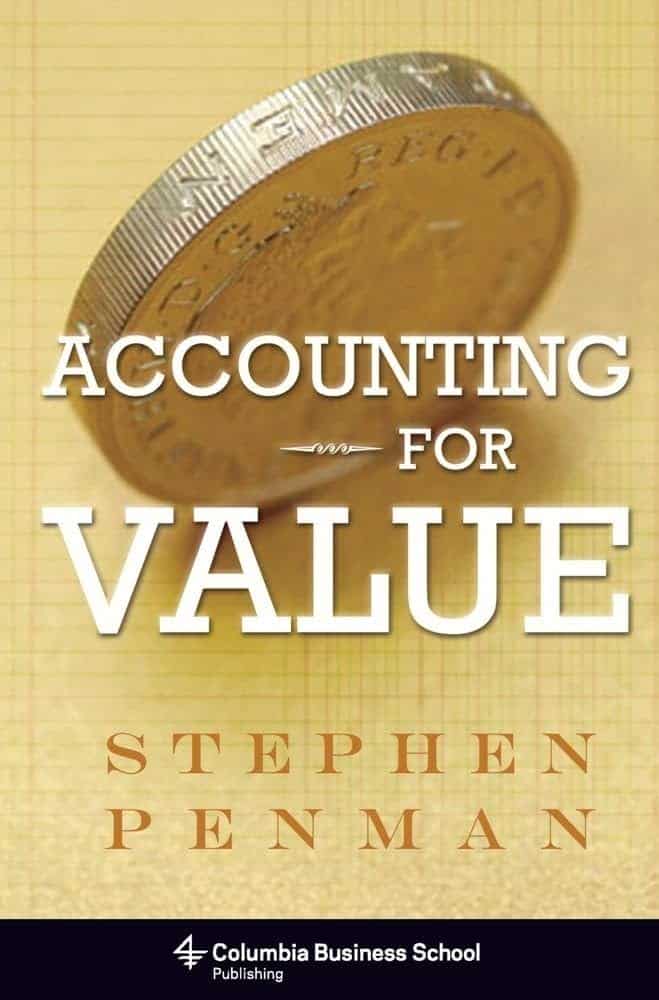Accounting for Value Book Overview
-
Book Title: Accounting for Value
-
Author: Stephen Penman
-
Publication Date: January 2011
-
Rating: 4.5
-
price: $23.74
-
Pages: 264
About the Author
Stephen Penman is a renowned professor of financial accounting and the author of several influential works on valuation and financial statement analysis. He brings decades of academic and practical expertise to "Accounting for Value," blending rigorous research with real-world insights.
Introduction to Accounting for Value Book
In the ever-evolving world of finance and investing, Stephen Penman's "Accounting for Value" emerges as a beacon of clarity, offering a fresh perspective on the critical intersection of accounting and valuation. As a distinguished professor at Columbia Business School, Penman brings decades of expertise to this insightful exploration, challenging conventional wisdom and redefining the role of accounting in value investing.
Accounting for Value Book Summary
"Accounting for Value" presents a compelling argument for returning to the fundamentals of financial analysis. Penman posits that accounting, far from being a mere historical record-keeping exercise, is a powerful, forward-looking tool that provides crucial insights into a company's future performance. This perspective is particularly relevant in today's volatile financial markets, where short-term thinking often overshadows long-term value creation.
Key Themes:
- The distinction between accounting numbers and valuation numbers
- The concept of "earnings quality" as a predictor of future cash flows
- The superiority of accrual accounting over cash accounting
- A critique of fair value accounting and complex financial reporting standards
- Practical applications of accounting principles in value investing
Analysis of Themes
Penman's work stands out for its emphasis on bridging the gap between accounting and valuation. He introduces the concept of "earnings quality," focusing on the reliability of earnings as an indicator of future cash flows. This approach allows investors to gauge a company's true financial health more accurately, moving beyond surface-level interpretations of financial statements. The author's critique of modern accounting practices, particularly the over-reliance on fair value accounting, is both timely and thought-provoking. Penman argues that while fair value accounting has its place, it can introduce unnecessary volatility and subjectivity into financial statements, potentially obscuring a company's true economic position.
"Accounting serves as the cornerstone of value investing, allowing investors to make decisions based on solid, empirical data rather than speculative market trends." - Stephen Penman
Writing Style
Penman's writing style is clear and authoritative, making complex financial concepts accessible to a wide range of readers. He skillfully balances theoretical insights with practical implications, enriching his arguments with real-world case studies and examples. This approach helps readers understand how to apply the book's principles to make more informed investment decisions.
Accounting for Value Book Strengths and Weaknesses
Strengths:
- Offers a fresh perspective on the role of accounting in valuation
- Provides practical tools and frameworks for investors
- Challenges conventional wisdom with well-reasoned arguments
- Incorporates real-world case studies to illustrate key concepts
Weaknesses:
- May be challenging for readers without a strong accounting background
- Some concepts may require further explanation for novice investors
- Limited discussion on the impact of emerging technologies on accounting practices
Comparison to Other Works
"Accounting for Value" distinguishes itself from other finance books by its focus on the fundamental role of accounting in valuation. While works like Benjamin Graham's "The Intelligent Investor" and Aswath Damodaran's "Investment Valuation" are seminal texts in value investing, Penman's book offers a unique perspective by emphasizing the critical link between accounting principles and investment decision-making. Compared to more recent works like "Financial Shenanigans" by Howard Schilit, which focuses on detecting accounting tricks, Penman's book takes a more constructive approach, showing how to use accounting information positively to uncover value.
Highlights from Accounting for Value by Stephen Penman
Valuation through Accounting: Emphasizes using accounting principles for accurate equity valuation rather than relying solely on speculative models.
Earnings and Book Value: Highlights the importance of analyzing a firm's earnings and book value to assess its true worth.
Risk and Return Alignment: Encourages understanding the relationship between risk and return, advocating for disciplined investment decisions based on solid financial data.
Avoiding Speculation: Warns against speculative forecasting and instead promotes valuation grounded in current financial statements.
Earnings Quality: Stresses the importance of distinguishing between recurring and non-recurring earnings for reliable valuation.
Investor Discipline: Advocates for a systematic approach to investment, focusing on value over market hype.
Conclusion
Stephen Penman's "Accounting for Value" is an essential read for anyone serious about understanding the intricate relationship between accounting and valuation. By advocating for a return to fundamental analysis grounded in robust accounting practices, Penman provides a valuable roadmap for navigating the complexities of modern finance. This book is particularly relevant in today's market, where cryptocurrencies, complex financial instruments, and rapidly changing market trends can obscure true value. Penman's emphasis on solid accounting principles offers a stabilizing perspective amidst the noise of short-term market fluctuations. For investors, financial analysts, and students of finance, "Accounting for Value" offers invaluable insights that can significantly enhance their approach to valuation and investment decision-making. It's a timely reminder of the enduring importance of accounting in the world of investing and personal finance.
By incorporating these principles into your investment strategy, you'll be better equipped to navigate market trends and make informed decisions about your personal finances. Don't miss out on this opportunity to enhance your financial acumen!





